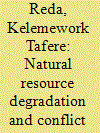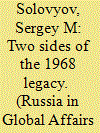| Srl | Item |
| 1 |
ID:
141436


|
|
|
|
|
| Summary/Abstract |
Based on a literature review, this article examines the dynamics in pastoral systems, natural resource conservation and conflict in the drylands of East Africa. It argues that, in the context of East Africa, pastoralism and biodiversity conservation in general are distinct forms of land use that are complementary rather than competitive. The present state of natural resource degradation in the drylands is explained in terms of factors related to ecological and demographic pressures, land use conflicts and inefficient land administration policies. When the customary pastoral institutions of land administration and resource management are threatened, the problem of degradation is further exacerbated and violent conflicts occur among multiple resource users, including pastoralists, farmers and the state. The article recommends the revitalisation, empowerment and recognition of pastoral institutions in a way that ensures effective synergy between the formal and customary structures of resource governance.
|
|
|
|
|
|
|
|
|
|
|
|
|
|
|
|
| 2 |
ID:
170601


|
|
|
|
|
| Summary/Abstract |
Abstract This article analyzes two responses by the Left to the turbulent events of 1968 in Europe and the failed attempt at revolution: the turn towards postmodern theory and the “minorities policy” is contrasted with the transition to urban guerilla warfare. The paper argues that the theoretical degradation of a considerable part of leftist thought after 1968 was a result of the transition to postmodernist attitudes. The article also analyzes the penetration of these trends into the concept of sociologist Immanuel Wallerstein, one of the most influential left-wing theorists. The article traces the logic behind the emergence of urban guerillas in Europe and the causes of their defeat. By analyzing both the postmodern and ultra-radical experience, the author offers some conclusions regarding the current situation and the future of Europe’s Left.
|
|
|
|
|
|
|
|
|
|
|
|
|
|
|
|